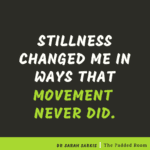I got you here because of the title of this essay. Plain and simple. It’s Psychology 101. If I title something in a certain way, you are going to click on the link. And lists, recipes and anything that promises a quick fix are top of the list of most viewed articles on the web.
Whether you know it or not, you came looking for secrets, trap doors and magic pills to fix what ails you. And I get it. You want the short cut. In this case you want the cheat sheet on how to be your best self, professionally and personally.
How do I know? Because the conversational equivalent unfolds within the first six sessions with every single patient.
Patient X: I want some homework or tasks to work on?
Me: Oh, okay. Great. I’d like you to work on your breath regulation every day between now and next session. Ten minutes at night and ten minutes in the morning. Practice up and down regulation patterns (if you work with me, you know what I am talking about).
Patient X: No, not that kind of home work. I want real homework.
Me: Real homework? Okay, so maybe something more challenging? How about this week you turn your attention to your practice of sleep and nourishment? Track your sleep and what you eat all week.
Patient X: No, but you’re not understanding what I want. I want homework (now said patient is really emphasizing hooommmmeeework.)
Me: Hmm. I feel like I gave you a lot of work to do. Would you like more? What about twenty minutes of non-sleep rest (this is my way of discussing mindfulness).
And you can imagine how the rest goes from there. The word homework is often code for, I want the secret to how to fix what ails me, but I’d like to bypass that whole hard work and self-reflection section of the gig.
But therein lies the problem with all the blogs, articles and essays that are titled like this one. They prey on the very instinct we all have to try and find a short cut, to circumvent the work.
Here is the secret that has emerged for me as I round the bend into my second decade in the trenches of human potential.
Nearly everyone I have ever worked with who has been orbiting in the high-performance arena (doesn’t matter the industry) for any significant amount of time has dialed in two key character features: Persistence/relentlessness and self-awareness.
Usually when someone lands in my office, persistence has slight dominance over self-awareness and we spend much of our work exploring the realm of self-observation and self-regulation.

Because I know you just can’t resist a good list, here are five things you can do every day to build the muscle of persistence and the space for self-awareness.
I repeat, as I have in so many other essays in The Padded Room–
This is not complex and it is not easy.
How you do one thing is how you do all things. Observe how you do things.
You are going to have work for this.
No one can do it for you.
Everyone is capable of this work.
But only a handful will see it through.
It’s not that you are too busy.
We have time for what we make time for.
This is an inside job.
1) NUTRITION
Over the decades, I have tried every style of nourishment under the sun – vegan, vegetarian, Paleo, keto, and on and on. Always with the lens of how is my body responding to this style of nourishment (versus how do I look). Now, in my forties, I have snuggled into the Michael Pollan theory of food, which suits me quite well.
Eat food.
Mostly plants.
Not too much.
When this is hard for you to do, please observe that. There is a reason it is hard for you to maintain this balance that has nothing to do with food. Food is the tangible representation of something in your psychology. And please don’t email me telling me you travel too much for work to maintain a balanced diet. It’s just not true. That’s a lie you tell yourself to justify giving up.
2) HYDRATION
Drink mostly water. There’s debate back and forth of the type of water and how much. I try not to get to wrapped up in all that stuff. I drink about 1 ounce of water per body weight before 6PM. But I really enjoy water. If you can achieve half that when you plug in your own data, you’ll be good.
Limit or eliminate alcohol. I always get gasps and side eye when I suggest this. And then, like the good shrink that I am, I suggest maybe we should just observe the reaction to the request. Either way, I get you to begin to observe your relationship with your habits.

3) SLEEP
Aim for seven to eight hours. Sounds easier than it is. Insomnia is an epidemic in our society. Chronic insomnia is associated with high rates of mental illnesses (depression, anxiety, post-partum, etc.), cognitive decline, and self-regulatory issues (impulsivity, over eating, etc.).
A few things to consider in creating your lair: Turn off the WIFI. Another time where I get those side eyes and gasps. Just turn it off. Please. Finally, no electronics for an hour before bedtime (and I am being nice because it should technically be for two hours).
Try this for a month and track your sleep each night. Not with any tech that needs WIFI. Just old school style. Pen, paper, and how you feel. Boom. Not everything needs tech in order to make it incentivized. And if it does, observe that too.
4) MOVEMENT
Regular exercise is one of the few things those of us in the health care industry routinely agree on. In my profession, you’d be shocked to see what a regular exercise program can do for people struggling with both mild to moderate anxiety and depression. Aim for more days than not. With half of those days, use it to challenge your cardiovascular fitness. The other half, design it to challenge your strength and flexibility.
And as always please train to your weakness. If something comes easy to you, try a different style of movement from time to time. The only way we train you into being optimal and balanced is through training to your weaknesses.
5) RECOVERY
Of all the pillars of performance that I tout day in and day out this is the one that gets the most resistance. Bar none. This resistance is a reflection of the fact that we are obsessed with doing but don’t take kindly to the idea of being much at all.
The technical term for what I you to play with here is referred to as “non-sleep rest” which, as it turns out, is super critical to our ability to sustain high-level performance.
This can be in the form of mindfulness, meditation, breath work, alert but restful self-observation, and on and on. If you really want to achieve peak or optimal performance, you are going to need to value recovery.
That doesn’t mean Netflix and chill. This is different. Recovery is a very particular kind of unwinding of the central and peripheral nervous system, as well as your brain and your mind. Over working depletes our brain, adrenals, and weakens our capacity for self-observation. When we are tired, we fall back into old patterns, almost always unconscious, that are sabotaging and only serve to reinforce bad habits.
Let me go a step further – I have never met a person thus far who has this critical aspect of performance dialed in, present company included. It took me decades to understand that rest and recovery are perhaps the single difference maker between those that struggle to achieve to their potential and those whose trend line consistently edges north.
In my case, stillness changed me in ways that movement never did.

When I started to truly invest in observing my own relationship with myself through the practice of stillness, that is when I began to truly grasp the concept of free will. That razor thin line between stimulus and response, where there is a blink of the eye where we can exert nuanced shifts in trajectory. Without this skill you will orbit endlessly in patterns of the past. This is the only way I have found to help people better acquaint themselves with their unconscious patterns of sabotage, which we all have. Click here if you need a refresher on my theory of sabotage.
Okay, that’s it for this week’s installment at The Padded Room. I’m way over the recommended 1200 words. Until next time…
Observe. Observe. Observe.






Trackbacks/Pingbacks